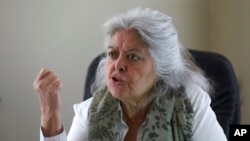As the world eagerly awaits the Norwegian Nobel Institute's announcement Friday of the 2023 Nobel Peace Prize laureate, Afghan women have a stake in the results.
Though official nominee names remain under wraps, an Afghan American women's rights stalwart, Mahbouba Seraj, is reportedly among the contenders.
The Norwegian Peace Institute, independent from the Nobel Institute, disclosed its director's top five prize candidates last week, featuring both Seraj and an Iranian human rights activist, Narges Mohammadi.
Currently in California for medical care, Seraj, 75, told VOA that receiving the prestigious prize would bolster her persistent fight for women's rights in Afghanistan.
“[The Taliban] cannot silence all voices — they may try, though, but someone has to speak up for the Afghan women inside the country,” Seraj said, adding that she would soon return to Afghanistan, where she manages a local nongovernmental organization supporting women.
The Taliban have been accused of imposing a gender-apartheid regime on Afghanistan, denying women most human rights, including work, education and political representation.
Treatment of women criticized
Human rights groups say the Islamist regime detains, tortures and silences women’s rights activists as part of its misogynistic rule. The Taliban deny such criticism.
“Indeed, it’s risky to work for women’s rights in Afghanistan,” said Seraj, “but someone has to be there to speak up for women. We have to take risks. There is no way around it.”
Since the Taliban's 2021 resurgence, many prominent Afghan women who worked in high-profile jobs in the former Afghan government have fled the country, fearing Taliban persecution.
From abroad, some Afghan women have maintained a robust call for action against the Taliban’s restrictive policies.
“We are tired of empty sympathy statements,” Asila Wardak, a former Afghan diplomat and member of the Women’s Forum on Afghanistan, said last month at an event at the U.N. General Assembly.
She urged the international community to undertake more meaningful actions to help support women inside Afghanistan.
“Mahbouba Seraj has put her life in danger and is still running a shelter in Kabul and is raising women’s voice,” Wardak told VOA, adding that the Nobel Prize would empower and inspire Afghan women.
However, Seraj's candidacy has not been devoid of controversy. Ties to a 19th-century Afghan monarchy that allegedly suppressed local uprisings have led some activists to challenge her nomination.
Her royal lineage briefly led to her incarceration in 1978 during a Soviet-backed regime shift, subsequently pushing her to migrate to the United States. She lived in the U.S. until 2003, then returned to her native Afghanistan.
“I will not leave Afghanistan again until my last breath,” Seraj vowed.
While the Taliban have publicly invited all Afghans, including former government officials, back home promising no retribution, it is unclear how the regime will receive women’s rights activists such as Seraj.




